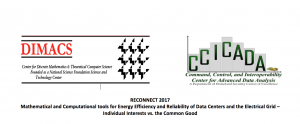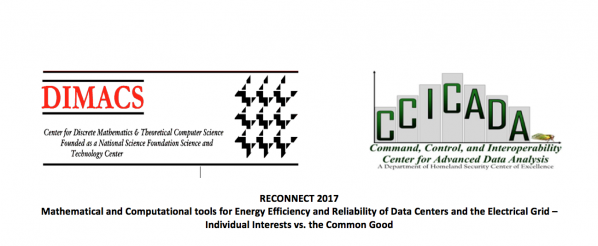Walker College of Business professors Joseph Cazier and Ed Hassler will present on sustainable electricity and their recent research with New River Light and Power (NRLP) during the 2017 RECONNECT conference, scheduled June 11-17, 2017 on the campus of Appalachian State University.
The weeklong RECONNECT workshop will be hosted by the Department of Mathematical Sciences on Appalachian's campus. The program, sponsored by Rutgers University, is entitled "Mathematical and Computational Tools for Energy Efficiency and Reliability of Data Centers and the Electrical Grid - Individual Interests vs. the Common Good."
About the conference:
The World Business Council for Sustainable Development (2008) indicates that buildings account for as much as 40 percent of energy use in industrialized countries. Data centers (computing facilities with electronic equipment for data processing, storage, and communications networking) are especially inefficient users of energy. In light of such issues, the information technology (IT) industry is looking to advanced power management hardware, smart cooling systems, virtualization tools, and dense server configurations to reduce energy consumption. Large scale sensor networks used in the design of these advanced systems are inherently graph theoretical. Part of Reconnect will be devoted to understanding these sensor networks. A second related area will examine the development of a truly "smart" electrical grid. The Smart Grid will include smart sensors and controls throughout the transmission and distribution system and a broad communication platform for two-way communications to move data and electricity between utilities and consumers. Smart Grid consumers will have smart meters that can track energy consumption, monitor individual power circuits in the home, control smart appliances, and actively manage energy use. Game-theory models, multi-agent based models, decision-support and optimization tools, and security and privacy tools will be considered. A third topic will explore policies for balancing individual interests with the common good to avoid an eventual "tragedy of the commons". In this area, game theory can model the interactions of multiple agents and show the effects of competing interests. Economic incentives may influence whether a country or a company is motivated to enter an agreement and then abide by it.
Generally, Cazier and Hassler's research, housed in the Walker College's Center for Analytics Research & Education (CARE) engages the knowledge of Appalachian students, faculty, and staff to help promote pro-social behavioral change within organizations and society.
The work with NRLP aims to use analytics to measure and promote more sustainable behaviors, including predicting power consumption and developing ways to help people track and lower power use in real time.
"We saved the university $20,000 during our pilot project and anticipate being able to save up to $250,000 a year once we reach full deployment of this project," said Cazier.
About RECONNECT
Reconnect Workshops expose faculty teaching undergraduates to current applications of mathematical and computational sciences and provide an opportunity for government or industry professionals to learn about recent research in related areas. Topics are presented in a weeklong series of lectures and activities; participants are involved in both research activities and in writing materials useful in the classroom or to share with their colleagues. Participants may develop materials for publication in either the CCICADA Technical Reports Series or the Educational Modules Series published by the DIMACS.
About the Center for Analytics Research & Education
The mission of the Center for Analytics Research & Education (CARE) is to engage and utilize the knowledge of our students, faculty, and staff to help promote pro-social behavioral change within organizations and society. To promote and enhance the reputation of the university and the center, CARE will live by the motto "Analytics for Good" by avoiding projects that would have a negative impact on society and seeking out those that have a positive impact. Two primary components that are inextricably linked are research and education. The center aims to gain new knowledge through academic research, conferences and papers; applied projects, such as consulting and workshops; and provide support to help internal and external systems through increasing the quantity and quality of data collection and analyses. By education, the center aims to provide support to degree program by hosting and supporting projects for students; offer executive education through consulting and workshops; and help university think about ways to improve the education process. Big data is inherently interdisciplinary and the need to appeal to all disciplines demonstrating the enhancement of research and other hidden relationships is vital to the advancement of the university. For more information, visit businesscare.appstate.edu.

